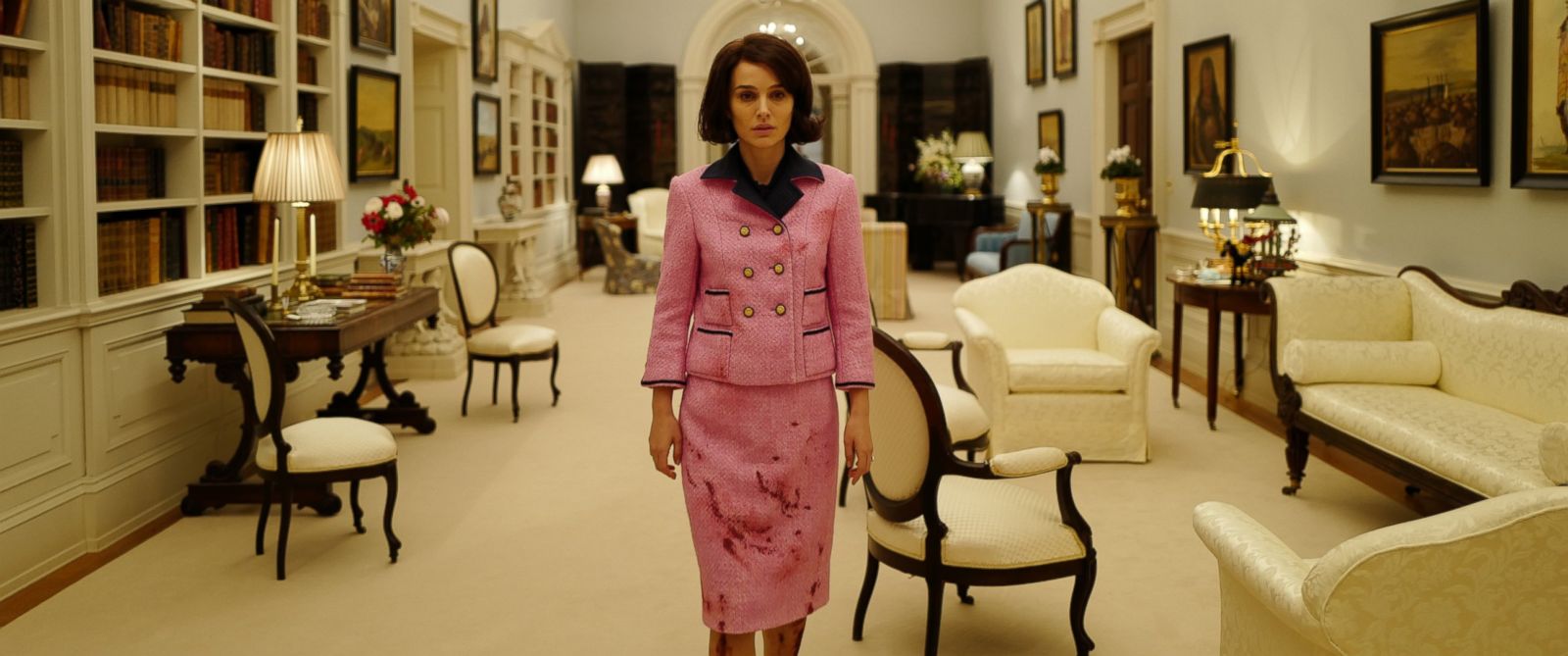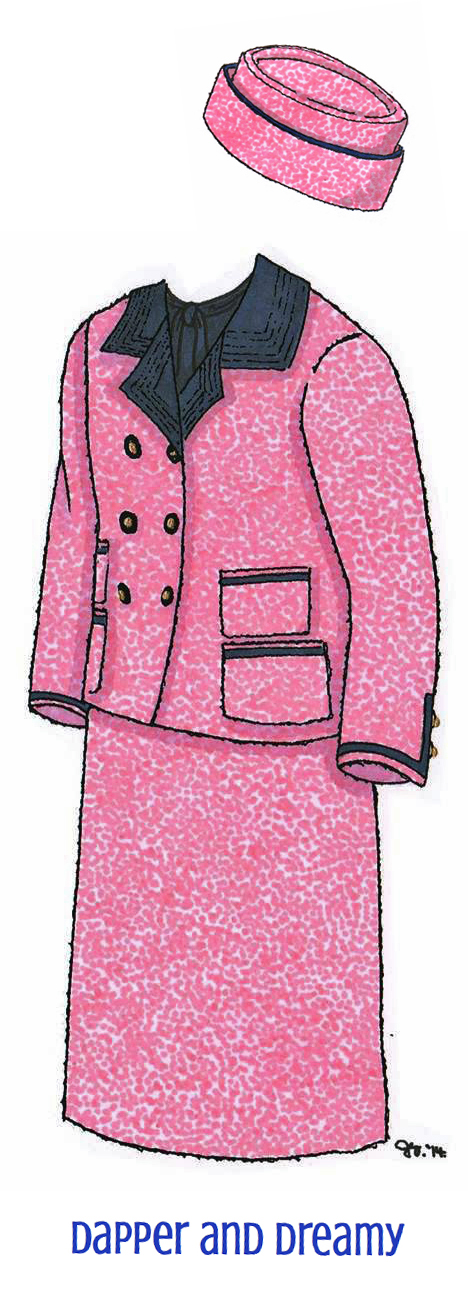Home
Jackie Movie Reviews

December 26, 2016
Review by Lynn Wooten
I think Natalie Portman has come closest of most actresses in capturing the essence of her as a human being vs. the usual stereotypical portrayal (along with, in my opinion, Blair Brown in "Kennedy"). The White House TV tour felt very authentic to me. I imagine those who have never seen the real TV tour might think it's a cheap impersonation and won't realize just how spot-on Portman is in recreating it. She certainly has come closest to capturing Jackie's public and private voices. The sets are also impressive, although "Hyannis Port" felt more like a lake house (which, I'm guessing, the property used for filming was).
But this is not a documentary. And that's really important to keep in mind for those of us who have followed this story so closely and know it in greater detail than those who haven't. It would be easy to fall into the trap of nitpicking it to death. Yes, there are some obvious -- and in many instances quite avoidable -- factual inaccuracies.
Again, it's a dramatic storytelling, not a documentary. I think you have to recognize going in that the timing of some things is off and has been condensed...it's a collection of snapshot scenes pieced together with flashbacks back and forth and out of order, etc.
For me, many things triggered deep emotional responses, and some are actually jarring -- it's one thing to see the fuzzy, grainy, yet still dramatic Zapruder film. It's quite another thing to see that scene recreated in extreme close-up. (Part of the very brief recreation is what it must have looked like from Nellie Connally's position). It takes your understanding of the horror to a different level.
There's also a tremendous amount of creative license because, let's face it, scenes of her alone can only be based on imagination and interpretation and assumptions of what a shell-shocked woman in mourning would likely experience alone (OK, maybe the manic dress-up scene is a stretch, but it's a drama).
Finally, the movie depicts a woman with flaws, who masterminded (manipulated?) not only one of the greatest pageants in history, but also one of the earliest modern-day examples of image-building in a mass media age.
Overall, I think "Jackie" achieves an essence -- a portrayal of what the real woman endured and how she suffered over a longer period of time, but condensed to the week after the assassination.
And in the end it's a tribute and knowing wink to the future, when she ultimately rose above all that and rebuilt her life as an evolved, independent woman who is remembered most for her dignity and personal and public triumphs.

Review by Brandon Wolf
The film shouldn't be seen as a documentary, because it isn't. The director made a comment, when the film was getting ready for release that Jackie "was sitting right beside him". Those words in quotes were emphasized with italics. He was transfixed with that, and wondered how anyone could emotionally survive a trauma like that.
The director grew up in a world of PTSD. Neither Jackie nor the country were aware of such a concept in 1963. Back then, it seems like there were four answers: 1) "get over it"; 2) "give it to God"; 3) turn to alcohol; or 4) end your own life, either through suicide or by just falling into the depths of depression that are a sort of emotional suicide.
I think that's what Larrain is trying to do here - show that Jackie went through a private hell that the public didn't see. And that she deserves credit for surviving it and moving on. She didn't just buck up and get on with it - it took a real struggle to re-adjust her life.
Lynn makes a point I intended to - the director is using the concept of 'composite' very heavily. In a 90 minute film, there isn't time to delve into every detail - and it's common practice to take several people and compact them into one. Nancy Tuckerman, for example, represented a variety of people, all focused into one character.
I also think Lynn gets it right that the director is taking what we now know from Barbara Lemming about Jackie's descent into torment, after she settled down in Georgetown. She cried a lot, she replayed the assassination over in her mind, hundreds of times, trying to figure out what she could have done to prevent it, she sometimes slept until 3pm, and she drank.
She also was considered fragile ice. Friends walked carefully, because she could be set off by seemingly compassionate overtures. When she read about her 'dignity' during the funeral, she said, "How did they expect I would act?"
When Ben Bradlee's wife suggested to her that her life was still far from over, and she had the chance of finding happiness again, Jackie cut her off, feeling she was betraying her loyalty to Jack.
So yes, the scene with the ball gowns and "Camelot" playing on the portable record player was over the top, but who is to say she didn't do that in Georgetown when everyone else was out of the house?
One reviewer noted that the film is about Jackie and her emotions. From the very beginning I was drawn in. Instead of the usual recreations of Dallas, we're right there with Jackie adjusting her pillbox. We're looking over her shoulder greeting the mayor of Dallas. We're seeing her recoil when she sees the ugly anti-Kennedy signs.
Even the assassination is not the usual images. We hear a bang and everything goes black and the next thing we know, we're overhead the limo racing to Parkland. Even the scene with Jackie reaching out on the trunk is reversed - we see it from the other side of the car and looking towards downtown - just as a witness would have seen it.
The picture above struck me. Instead of the usual shot of the swearing in, we see what LBJ did not want the public to see - but which ironically Jackie did. She did not want to homogenize the deed - she wanted the effects of it to be obvious.
So, all in all, it's a fairly accurate look at the assassination - only this time totally from Jackie's viewpoint. Yes, things are compacted and there is some 'imagining' going on. But it's all still based on the true story.
I couldn't help but think the scene where she walked into the autopsy room (which she didn't actually do) emphasize the horror of it all. In the course of 18 hours, she went from being America's queen to being 'something' (as she put it) in a bloody suit.
With gruesome images in her mind that for most of us are unimaginable. In that scene she finally just screamed and fled - overwhelmed with all that was happening to her.
I still wonder if the director was making a point at the end when she saw the Jackie mannequins being unloaded from a truck and put into a department store window - that this film did not treat her like a mannequin. As she drives by and on, we see the real woman - broken and bitter - something she was never accorded during those days.
Instead, we wanted the tragic, stoic, beautiful widow - Our Lady of Sorrows - to keep on being just that. But she herself said, "They aren't going to wheel me out like Mrs. McKinley" - and also "Better to fall from your pedestal than freeze to death up there."
All in all, I give the film big points for telling a story in a very unconventional way - one that kept me riveted. And it even left me with a sense of hope, at the end as she runs into the sunset with the children, and the voiceover says, "We must let people know that these were real people who existed."
At the end of the day, that is what makes this group different than any other on Facebook. We treat Jackie like a real person. And doing so only makes us admire her all the more. She herself once said to friend who asked what she was the proudest of - "Well, I think the fact that I've been through a lot, and I'm still basically sane." And as Caroline has said, "She had the very worst happen to her, but she survived it and went on to lead a very productive life."
She was one of a kind - a unique and gracious woman, compassionate and intelligent. Someone once asked JFK to describe her in one word and he said 'fey'. If you look up the meaning of that, you'll see that it means 'magical'. And magical she was ....
Jackie is a 2016 biographical drama film directed by Pablo Larraín and written by Noah Oppenheim. The film stars Natalie Portman as the titular character, following her life after the 1963 assassination of her husband John F. Kennedy. Peter Sarsgaard, Greta Gerwig, Billy Crudup and John Hurt also star. It was selected to compete for the Golden Lion at the 73rd Venice International Film Festival and was released in the United States on December 2, 2016 by Fox Searchlight Pictures.
Images courtesy Fox Searchlight Pictures.



